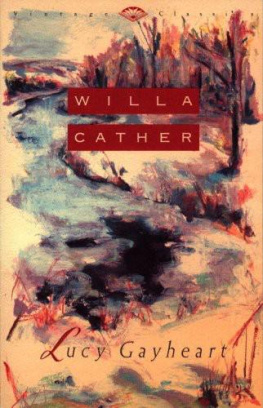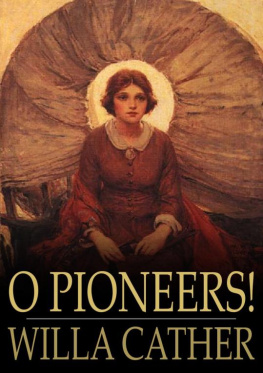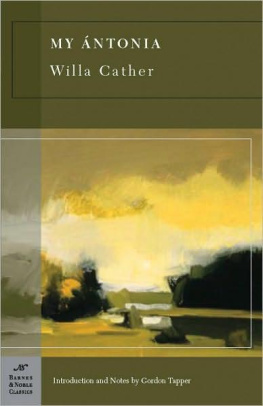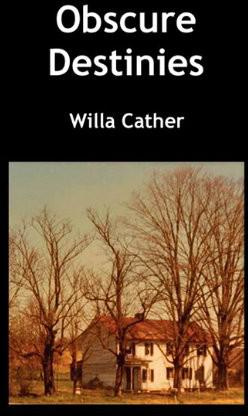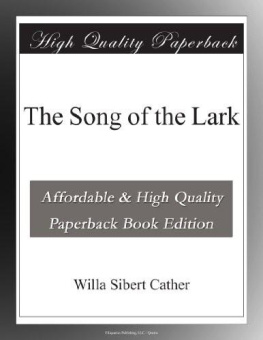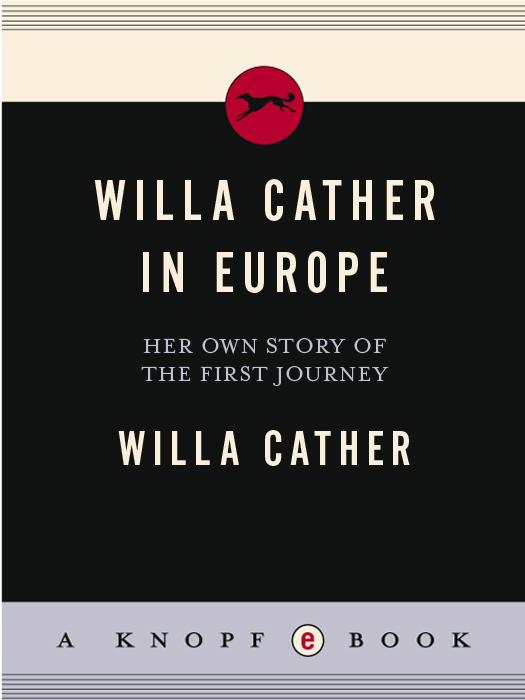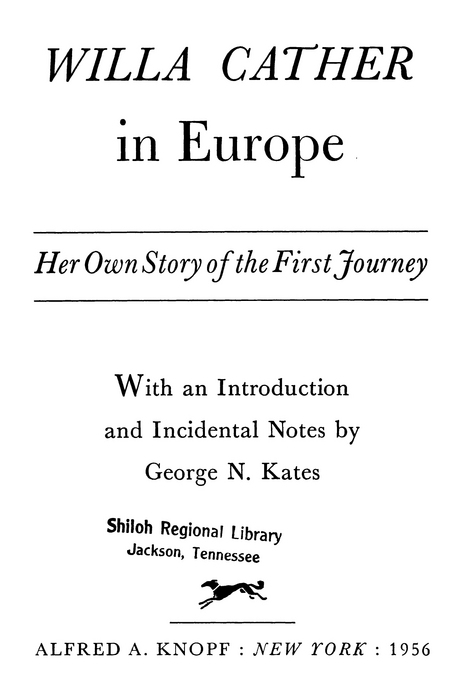THE EXECUTORS OF THE ESTATE OF WILLA CATHER , 1956

C OPYRIGHT 1956 by The Executors of the Estate of Willa Cather. All rights reserved. No part of this book may be reproduced in any form without permission in writing from the publisher, except by a reviewer who may quote brief passages in a review to be printed in a magazine or newspaper.
eISBN: 978-0-307-83146-0
v3.1
INTRODUCTION
Not often are we given an opportunity to observe a great American writer arrive for the first time in the Old World from the New, there to record first impressions spontaneously, as they came, subject to no second thoughts, no later, leveling revision. The fourteen travel articles that form the present volume, written by Willa Cather on a first journey to England and France, give us just such a record. They were made for pay, jotted down quickly, often in obvious haste, and then apparently sent back just as they were to the Nebraska State Journal, in Lincoln. There they were set up in print, also with no special care, to fill a weekly column or two of the local paper.
1902 was the Edwardian year when Willa Cather, with her friend Isabelle McClung, proceeded on this journey. We can follow them as they go, from Liverpool to Chester and Shrewsbury, to Ludlow and the quiet Shropshire country; onward into the dim vastness of Londonwhich almost overwhelmed her by its contrast with anything she had met beforethen further across the Channel to other skies, to Rouen, Paris, and the Midi.
In this summer Willa Cather was still only twenty-eight. Her writing career, at least in terms of books, still lay wholly ahead of her. She had been teaching English and Latin in one of the high schools of Pittsburgh, and she was to go back to her classes after this vacation. Even her first slim volume of poetry, April Twilights, was to appear only in the following year. As we shall see, it bears more than one mark of this journey.
The interest of the present materialin spite of all its marks of unplanned and unorganized writingis double. We shall of course first catch impressions, fresh, as they occurred. Then, subsequently, we shall be able to trace their development through a whole career. Some seed fell on barren ground. Certain subjects here loom large; and later never appear again. Others, indistinguishable from them, perhaps, were we not in the privileged position of knowing a future still unrevealed to the author herself, are to grow from this summer of 1902 until after many years they will become the main themes of her matured and finest work.
Step by step we here can see a country-bred girl, a young schoolteacher who except for a few years in Pittsburgh had known only early childhood in rural Virginia, and then an untrammeled life growing up in the developing West, make her first experiences amid all the heaped-up riches, the accumulated treasure, of European civilization, feeling deeply its weight and glory, its past and present.
For much of what she thus was to confront, Willa Cather was by no means unprepared. She was, we know, unusually well read, in several literatures, even for a generation more serious about such matters than we are in general today. She was properly grounded, also, in her knowledge of European art. Her classical education had included both Greek and Latin; as enjoyments, moreover, rather than as disciplines. We shall find her on terms of easy familiarity with the lives of poets like de Musset and Heine. She has made a cult of Flaubert; she is an enthusiastic admirer of A. E. Housman for some time before his reputation is made. As spectators we can watch the precious moments of first revelation, the excitements, the joys, as one by one she discovers traces of their lives, here on their native soil. These were major confrontations; and they sank in for life.
The creative process is highly mysterious. As spectators, we have of course a great advantage. We are able to move up and down the time scale of her career at will, following vital processes from their first germination here in these rapidly tossed-off pages, through curious transformations, even through silent and subterranean development, into permanent form, often achieved only many years later. We can, moreover, observe this development long before she herself could have been aware of what was happening.
What later was to become, even for Europe, the precious, the incommunicable past is here merely the fleeting present, seen with fresh eyes, fresh energies, and fresh talents. Here speaks youth, a youth she would try hard to overlay with maturity before she felt emboldened to transform into verse or prose what she had found. Certain colors of the palette are tried herewe can trace themnever to be used again. Some scenes, the magical effect of certain places, will only grow in intensity, in depth and significance, as long as life endures. Her unexpected love for the Midi is an example. We can watch instinct at work long before it was to reveal itself. There are suggestions on every page.
The roughnesses, the occasional immaturity, are of minor importance. What matters is the inspiration, the great individuality of the impression. So much in these sketches is young, active, vigorous, and competent. There are plenty of provincialisms, of Americanisms, even those of 1902. Much seems improvised, even at the moment of impact in revelatory travel. Yet the reader will also find passages that are a foretaste of her highest style, passages of unchallengeable beauty and power. These he may wish to select for himself; her description of a world transformed, during the night crossing from England to France, however, or her contrast of unreal and unsatisfactory Monte Carlo with nourishing Provence, are typical examples.
It is also interesting to see what was not used later! Her curiosity about the arrangement of Parisian cemeteries, for example, at least as a formal setting, seems to have been quite transitory. Liverpool, Chester, and Ludlow, at the beginning of the journey, yielded to far more interesting places as it progressed. All is nevertheless a prefiguration, part of a wonderful and vital record, pregnant with creation to come.
A few words may here be in place about the text itself. It shows many marks of haste, there is often loose grammar, obvious repetition. Indeed, there are so many superficial imperfections that one can only deduce real impatience, at times, to fulfill a set task while new life was calling, with high allurement, on every hand. One also fancies that the uninstructed local compositor, in Nebraskano doubt reading hastily written copyoften has only added further error.
Titles to each article have been added; although dates are as Willa Cather gave them. Spellings and occasional punctuation have been standardized; and there have also been made a few occasional small changes necessary for sense. These last, though, were decided upon merely to make casual reading easier. No crudities were erased, no repetitious language improved upon.
Here, then, without embellishment, and now with the perspective of over half a century, we can secure glimpses of Willa Cathers youth, of high aspiration, of seriousness and honor. This is a record of early enthusiasms, on a wonderful first journey to taste of the riches of the world.


